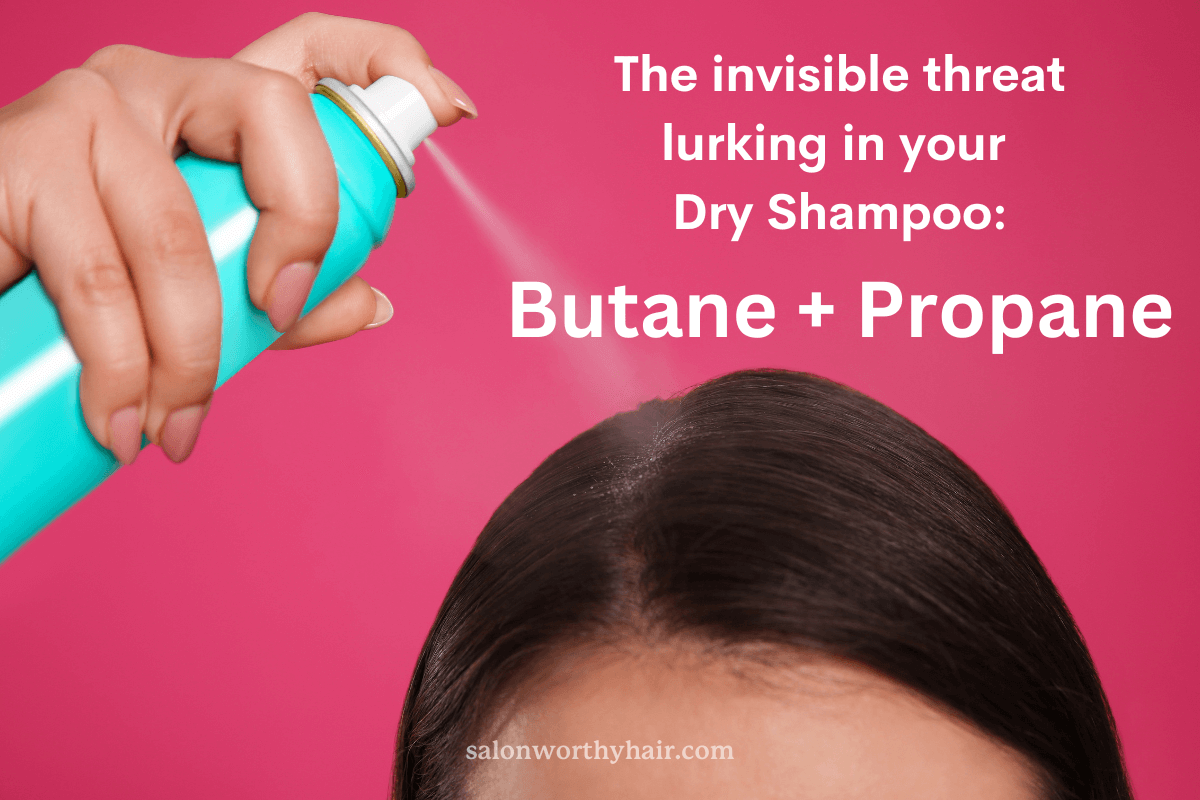5 Best Dry Shampoos Without Butane and Propane
Updated on
This post may contain affiliate links. As an Amazon Associate, we may earn from qualifying purchases.

Dry shampoo is an indispensable hair product that can refresh second-day hair, absorb oil from your scalp, refresh your hair between washes, and add volume in just a few sprays.
However, some popular dry shampoo brands contain questionable ingredients like Butane and Propane, which can damage your hair and health when used too often.
- Butane
- Butane is a highly flammable hydrocarbon gas. Its primary function is as a propellant, helping to disperse the product evenly from the aerosol can onto the hair. Butane is sourced from natural gas and petroleum. It is a common component in lighter fluid and is used in fuel for portable stoves and heaters.
In dry shampoos, Butane dissolves other ingredients to deliver a quicker drying effect on the hair. However, this rapid evaporation can strip natural oils from the hair, leading to potential dryness or brittleness.
- Propane
- Propane is also a flammable hydrocarbon gas. Similar to Butane, Propane, sourced from natural gas processing and petroleum refining, serves as a propellant to eject the product from its aerosol container. This hydrocarbon gas has high volatility with the ability to vaporize quickly, which makes it a key ingredient in many dry shampoos.
In the world of dry shampoos, the presence of Butane and Propane is significant. While they play an essential role in the functionality of aerosol delivery systems, their potential side effects on hair health and overall well-being make it vital for consumers to be informed and make choices that align with their preferences and needs.
To ensure you’re not unknowingly compromising your hair and health, I’ve decided to curate a list of dry shampoos that do not contain Butane and Propane. These recommendations promise the same reviving results without the hidden risks.
Here are the best Butane and Propane free dry shampoos to consider:
This post contains affiliate links. As an Amazon Associate, we may earn from qualifying purchases.
1. Briogeo Scalp Revival Charcoal + Biotin Dry Shampoo
Briogeo’s Scalp Revival Charcoal + Biotin Dry Shampoo offers a unique, non-aerosol formulation, free of Butane and Propane, commonly found in aerosol-based dry shampoos. This product is infused with charcoal, tea tree, and biotin to nourish the scalp and hair while absorbing excess oils.
With 99% of its ingredients naturally-derived, it provides a vegan and cruelty-free option for consumers seeking a healthier alternative to traditional dry shampoos.
Ingredients:
- Oryza Sativa (Rice) Starch
- Zea Mays (Corn) Starch
- Kaolin Clay
- Sodium Bicarbonate
- Manihot Esculenta (Tapioca) Root Starch
- Sodium Hyaluronate Powder
- Bambusa Arundinacea (Bamboo) Powder
- Biotin
- Hamamelis Virginiana (Witch Hazel) Leaf Extract
- Charcoal Powder
- Citrus Aurantium Dulcis (Orange) Peel Oil
- Prunis Persica (Peach) Fruit Extract
- Fragrance
2. The Earthling Co. Dry Shampoo
The Earthling Co. Dry Shampoo is an aerosol-free, plastic-free, and sulfate-free product presented in 100% paper packaging, underscoring the brand’s commitment to sustainability.
It does not contain Butane and Propane.
It’s an environmentally conscious alternative to conventional dry shampoos formulated with clean and organic ingredients.
Ingredients:
- Maranta Arundinacea Root Powder
- Bentonite
- Hydrolyzed Rice Protein
- Rosmarinus Officinalis (Rosemary) Leaf Oil
- Biotin
- Salvia Sclarea (Clary) Oil
- Bambusa Arundinacea Stem Powder
- Pelargonium Graveolens Flower Oil
3. Drop Dead Gorgeous Non Aerosol Dry Shampoo
The Drop Dead Gorgeous Non Aerosol Dry Shampoo is a natural solution for those seeking to revive greasy hair without the use of conventional shampoos.
It deodorizes with bamboo charcoal and refreshes with peppermint and eucalyptus, providing a fresh feel without a wash. This award-winning product stands out in the dry shampoo market with its 100% naturally derived ingredients, completely free from Butane, Propane, Isobutane, and Carcinogens. This commitment to health and safety, coupled with its proven effectiveness, makes it a preferred choice for those seeking a safer, cleaner alternative to traditional aerosol-based dry shampoos.
Ingredients:
- Rice powder
- Kaolin Clay
- Cocoa Powder
- Charcoal
- Lavender Oil
- Peppermint Oil
- Eucalyptus
- Geranium Oil
4. MooGoo Dry Shampoo Waterless Cleanser
The MooGoo Dry Shampoo Waterless Cleanser is a natural, non-aerosol powder shampoo that freshens hair between washes. Made with Corn and Tapioca Starch, it effectively absorbs oils and is suitable for all hair types and colors.
The product comes in a shake bottle delivery system, avoiding the use of harsh ingredients that can coat and irritate the scalp. As an alternative to traditional aerosol dry shampoos that often contain volatile hydrocarbons, MooGoo offers a safer, Butane-free, and Propane-free solution. It avoids the potential dangers of fine aerosol particles entering the lungs and causing scalp irritation.
Ingredients:
- Zea Mays (Corn) Starch
- Kaolin
- Tapioca Starch
- Bentonite
- Sodium Bicarbonate
- Piroctone Olamine
- Fragrance
5. Rahua Voluminous Dry Shampoo
Rahua Voluminous is a potent, plant-based dry shampoo that cleans, refreshes, and adds volume to all hair types.
Crafted without harmful Butane and Propane, it emphasizes safety and environmental responsibility with an eco-friendly non-aerosol dispenser. The formula boasts organic, food-grade Cassava starch that absorbs oil and perspiration, along with cosmetic clay for further oil absorption. The inclusion of organic star anise ensures a pleasing fragrance and helps maintain scalp health.
Ingredients:
- Fuller’s Earth Clay
- Organic Tapioca Starch
- Star Anise
- Vanilla Planifolia
- Citric Acid
Dangers of Overusing Aerosol-Based Dry Shampoos
- Flammability: Both Butane and Propane are highly flammable. This means that they can easily ignite and cause fires if they come into contact with a heat source or flame. This can pose a risk if aerosol cans are stored near a heat source, used near an open flame, or if they are punctured or damaged.
- Inhalation: If inhaled in large amounts, Butane or Propane can displace the oxygen in the air, potentially leading to symptoms like dizziness, light-headedness, and in extreme cases, loss of consciousness or asphyxiation.
- Skin and Eye Irritation: Direct contact with these propellants can cause irritation to the skin and eyes. In some cases, it may also cause allergic reactions.
- Environmental Impact: There is some concern about the impact of these propellants on the environment. Butane and propane contribute to ground-level ozone formation, a key component of smog.
- Container Explosion: Under certain conditions, the aerosol cans that contain these propellants can explode. This can occur if the can is heated, punctured, or damaged in some way.
- Inappropriate use or misuse: There have been reports of misuse of aerosol products, including inhalant abuse, which can have serious health consequences.
It’s important to note that these risks are generally low when the product is used as directed. Most incidents occur when the product is misused or used in a way that is not recommended. As with all products, it’s important to read and follow the instructions on the label.
How To Keep Your Hair Fresh And Clean For Longer Without Dry Shampoos
It’s no secret that dry shampoos are lifesavers.
But too much of it can do more harm than good, especially if you’re using cheap ones that contain aerosols.
Let me give you some tips on how you can limit the use of dry shampoos and still keep your hair clean and refreshed in between your washes.
Tips to keep your hair clean and fresh for longer without dry shampoos:
- Avoid Over-Washing Your Hair: Washing hair every day can strip its natural oils, making the scalp produce even more oil in compensation. Depending on your hair type, it might be beneficial to wash your hair every other day or even less frequently.
- Use a Mild Shampoo: When you do wash, opt for a sulfate-free and mild shampoo that cleanses without overly stripping the hair and scalp.
- Massage Your Scalp Regularly: Massaging your scalp regularly can stimulate blood circulation and help distribute natural oils, keeping hair fresher for longer.
- Avoid Touching Your Hair: Our hands can transfer dirt and oils to our hair. Try to avoid constantly touching, twirling, or brushing your hair throughout the day.
- Change Pillowcases Regularly: Dirt and oil can accumulate on your pillowcases, which can then transfer to your hair. Consider changing them once or twice a week.
- Brush Your Hair Regularly: Brushing your hair regularly removes lint and dust that accumulate and make your hair and scalp dirty. Brushing with a Boar Bristle Brush also helps distribute scalp sebum from the roots to the lengths of your hair.
- Avoid Products with Heavy Silicones: While silicones can make hair look shiny and smooth, they can also attract dirt and buildup, making hair look and feel greasy over time.
Stay Away from Butane and Propane Dry Shampoos
Dry shampoos are a popular haircare product that refresh and add volume to hair. However, many contain Butane and Propane, flammable hydrocarbon gases that can harm hair and health. Despite their functional role in aerosol delivery, these ingredients can lead to hair dryness, brittleness, and have other potential side effects.
So, if you are a regular user of dry shampoos, we suggest looking at our curated list of non-toxic options.
About the Author
 Charlene Latreuille
Charlene LatreuilleCharlene Latreuille has been blogging for over 10 years and has a background in digital marketing.
Specializing in women's hair health, she blends scientific insight with practical advice, crafting easy-to-follow guides.




